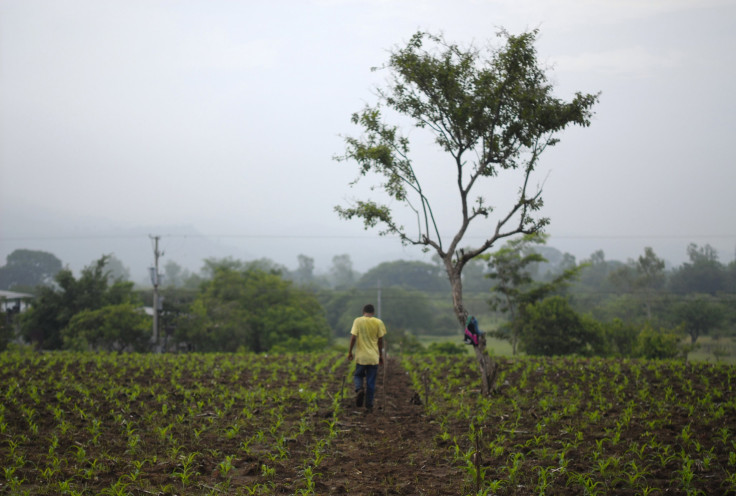The US Wants To Force GMO Seeds On Salvadoran Farmers, But They're Resisting: Report

Salvadoran farmers are protesting a stipulation in a $277 million U.S. aid package that would have indirectly required them to purchase American agricultural giant Monsanto Corp.'s (NYSE:MON) genetically modified corn and bean seeds rather than source seeds locally, according to a report published on Tuesday but denied by the U.S. Embassy in San Salvador.
According to the nonprofit Truthout.org, Monsanto is known for using “suicide seeds” or “terminator technology,” genetically engineered and patented seeds that produce crops that once harvested, reproduce sterile seeds. That forces farmers to buy new seeds annually to keep harvesting their crops, the report said. Monsanto says this is a myth and it made a commitment in 1999 not to commercialize sterile seed technology in food crops.
“Transnational companies have been known to provide expired seeds that they weren’t able to distribute elsewhere,” Juan Joaquin Luna Vides, a 45-year-old farmer and head of a Salvadoran community development organization called Diversified Production at the Mangrove Association, told Truthout.
“We would like the U.S. Embassy and the misinformed media outlets [that are pressuring the Salvadoran government to change the procurement procedure] to know more about the reality of national producers and recognize the food sovereignty of the country,” he added.
Monsanto controls seed sectors in much of the world, especially India, where tens of thousands of farmers have lost their livelihoods. Many farmers, like a group in Brazil, have filed lawsuits against Monsanto. The company's influence over the global seed industry is "very worrying," according to the Center for Research on Globalization.
Truthout's report said that over the past two months, the U.S. government has been pressuring El Salvador to sign a five-year compact with the Millennium Challenge Corporation, a U.S. foreign aid agency. It also asserted that the signing agreement requires El Salvador to purchase GM seeds from Monsanto.
"Despite allegations in some of the Internet stories, this is not something that Monsanto pursued with the U.S. government in Washington," Monsanto spokesman Tom Helscher said Wednesday.
According to MCC, it is fueling economic growth in El Salvador through investments in people and infrastructure and improved energy supply. The U.S. Embassy in San Salvador said in an online statement that "the U.S. government concern with the [Salvadoran] Ministry of Agriculture’s procurement program is completely unrelated to the purchase of genetically modified seeds."
"We are asking the government of El Salvador to implement the procurement program for corn and bean seeds in a competitive, objective and transparent manner," the embassy said.
Truthout reports that the Confederation of Federations of Salvadoran Agrarian Reform (CONFRAS), which represents 131 farming cooperatives in the country and nearly 6,000 rural farmers, said in May: “We are threatened because the U.S. is pressuring the government of El Salvador so that its seed is not purchased from local families struggling to escape poverty, but transnational businesses.”
The embassy said July 3 that the U.S. government is now satisfied with the way the government of new President Salvador Sánchez Cerén, a leftist former guerrilla commander, will buy seeds.
"The demonstrations given by the Salvadorian government in this regard, reflect determination from the Sánchez Cerén administration to respect international commitments and to promote a commercial environment that accelerates the long-term economic growth and promotes prosperity for all Salvadorians," the embassy said, adding that further negotiations over the foreign aid package will be over reforms to money-laundering laws.
© Copyright IBTimes 2024. All rights reserved.






















